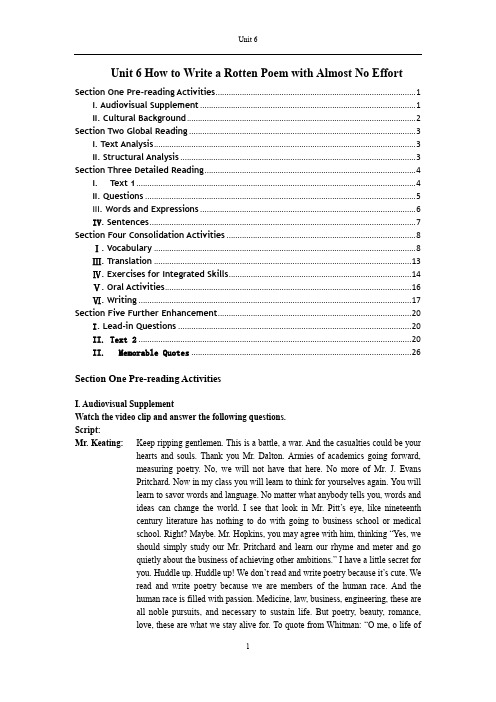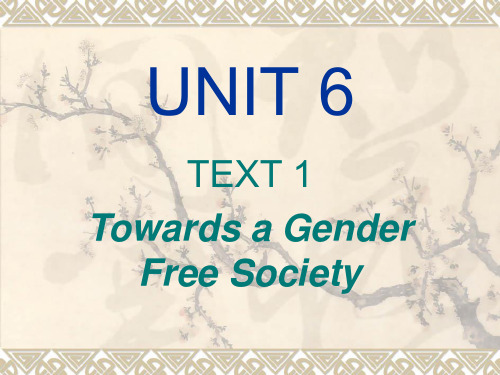新航标职业英语·综合英语2Unit 6-PPT
- 格式:ppt
- 大小:13.46 MB
- 文档页数:111

Unit 6 How to Write a Rotten Poem with Almost No EffortSection One Pre-reading Activities (1)I. Audiovisual Supplement (1)II. Cultural Background (2)Section Two Global Reading (3)I. Text Analysis (3)II. Structural Analysis (3)Section Three Detailed Reading (4)I.Text 1 (4)II. Questions (5)III. Words and Expressions (6)IV. Sentences (7)Section Four Consolidation Activities (8)Ⅰ. Vocabulary (8)Ⅲ. Translation (13)Ⅳ. Exercises for Integrated Skills (14)Ⅴ. Oral Activities (16)Ⅵ. Writing (17)Section Five Further Enhancement (20)I. Lead-in Questions (20)II. Text 2 (20)II.Memorable Quotes (26)Section One Pre-reading ActivitiesI. Audiovisual SupplementWatch the video clip and answer the following questions.Script:Mr. Keating:Keep ripping gentlemen. This is a battle, a war. And the casualties could be your hearts and souls. Thank you Mr. Dalton. Armies of academics going forward,measuring poetry. No, we will not have that here. No more of Mr. J. EvansPritchard. Now in my class you will learn to think for yourselves again. You willlearn to savor words and language. No matter what anybody tells you, words andideas can change the world. I see that look in Mr. Pitt’s eye, li ke nineteenthcentury literature has nothing to do with going to business school or medicalschool. Right? Maybe. Mr. Hopkins, you may agree with him, thinking “Yes, weshould simply study our Mr. Pritchard and learn our rhyme and meter and goquietly abou t the business of achieving other ambitions.” I have a little secret foryou. Huddle up. Huddle up! We don’t read and write poetry because it’s cute. Weread and write poetry because we are members of the human race. And thehuman race is filled with passion. Medicine, law, business, engineering, these areall noble pursuits, and necessary to sustain life. But poetry, beauty, romance,love, these are what we stay alive for. To quote from Whitman: “O me, o life ofthe questions of these recurring, of the endless trains of the faithless, of citiesfilled with the foolish. What good amid these, o me, o life?” Answer: that youare here. That life exists, and identity. That the powerful play goes on, and youmay contribute a verse. That the powerful play goes on and you may contribute averse.Questions (在每个问题下面设置按钮,点击以后出现对应的答案)1.Why should students of all majors study poetry?2. Are student s’ expressions changing when they are listening to Mr. Keating’s words? Answers1. Because poetry has universal value. It stands for human passion and love and these are what we are living for.2. Yes, they are all inspired by Mr. Keating’s speech about the meaning of poetry.II. Cultural BackgroundAbout Poetry1.History of Poetry●Some of the earliest poetry is believed to have been orally recited or sung, closelyrelated to musical traditions, and much of it can be attributed to religious movements: rhythm, rhyme, compression, intensity of feeling, the use of refrains.●Following the development of writing, poetry has since developed into increasinglystructured forms.Written composition meant poets began to compose for an absent reader.●Much poetry since the late 20th century has moved away from traditional forms towards themore vaguely defined free verse and prose poem formats.2.ClassificationThree major genres:●Epic poetry:a long story about brave actions and exciting events;●Lyric poetry: more personal, shorter poems intended to be sung;●Dramatic poetry: comedy and tragedy as subgenres.Section Two Global ReadingI. Text AnalysisModern life is more about material and tangible goods than about spirit pursuit. We set clear targets for our future, neglecting that we are gradually losing one joy that human kind usually have: the fun of spontaneity. The writer of this essay reminds us that poetry, especially creating poems, can provide us such pleasure. Though the writer of this essay writes in a half-mocking tone, and the method he introduces will not ensure us to create a wonderful, or even presentable poem, his real purpose is to make the creation of a poem less difficult than we may imagine and to induce amateurs to set their first steps on their journey to a more aesthetic life.II. Structural Analysis1.In terms of organization, the article clearly falls into three main parts:The first part (Paragraphs 1-3) introduces the problem with poetry and the significance of the writer’s solution.The second part (Paragraphs 4-9) introduces in detail how people can create a poem of their own. The third part (Paragraphs10-12) serves as the ending of the essay. In this part, the writer reiterates his intention and make s kit clear he is just joking by presenting such a method of creating a poem..2.The mocking tone of the author is mingled with some fairly emotional statements whichreveal his real love of poetry, e.g.“Once a person has written a poem, of whatever quality, he will feel comradeship with fellow poets and, hopefully, read their works. Ideally, there would evolve a veritable society of poet-citizens, which would elevate the quality of life worldwide. Not only that, good poets could make a living for a change.” (Paragraph 3)“But at least it’s a poem and you’ve written it, which is an accomplishment that relatively few people can claim.” (Paragraph 10)“Chances are, you’ll find their offerings stimulating and refreshing. You might even try writing some more of your own poems, now that you’ve broken the ice. Observe others’ emotions and experience your own —that’s what poetry is all about. (Paragraph 11)III. Rhetorical FeaturesApparently simple but lucid English, sometimes even a colloquial speech style, creating the effect of a heart-to-heart talk between the writer and the reader, e.g.“The last line of your poem should deal with the future in some way.” (Paragraph 8)“Now that poem (like yours, when you’re finished) is rotten.” (Paragraph 10)Section Three Detailed ReadingI.Text 1How to Write a Rotten Poem with Almost No EffortRichard Howey1 So you want to write a poem. You’ve had a rotten day or an astounding thought or a car accident or a squalid love affair and you want to record it for all time. You want to organize those emotions that are pounding through your veins. You have something to communicate via a poem but you don’t know where to star t.2 This, of course, is the problem with poetry. Most people find it difficult to write a poem so they don’t even try. What’s worse, they don’t bother reading any poems either. Poetry has become an almost totally foreign art form to many of us. As a result, serious poets either starve or work as account executives. There is no middle ground. Good poets and poems are lost forever simply because there is no market for them, no people who write their own verse and seek out further inspiration from other bards.3 Fortunately, there is a solution for this problem, as there are for all imponderables. The answer is to make it easy for everyone to write at least one poem in his life. Once a person has written a poem, of whatever quality, he will feel comradeship with fellow poets and, hopefully, read their works. Ideally, there would evolve a veritable society of poet-citizens, which would elevate the quality of life worldwide. Not only that, good poets could make a living for a change.4 So, to begin, have your paper ready. You must first understand that the poem you write here will not be brilliant. It won’t even be mediocre. But it will be better than 50% of all song lyrics and at least equal to one of Rod McKuen’s best efforts. You will be instructed how to write a four-line poem but the basic structure can be repeated at will to create works of epic length.5 The first line of your poem should start and end with these words: “In the —of my mind.” The middle word of this line is optional. Any word will do. It would be best not to use a word that has been overdone, such as “windmills” or “gardens” or “playground.” Just think of as many nouns as you can and see what fits best. The rule of thumb is to pick a noun that seems totally out of context, suc h as “filing cabinet” or “radiator” or “parking lot.” Just remember, the more unusual the noun, the more profound the image.6 The second line should use two or more of the human senses in a conflicting manner, as per the famous, “listen to the warm.”This is a sure way to conjure up “poetic” feeling and atmosphere. Since there are five different senses, the possibilities are endless. A couple that come to mind are “see the noise” and “touch the sound.” If more complexity is desired other senses canbe added, as in “taste the color of my hearing,” or “I cuddled your sight in the aroma of the night.” Rhyming, of course, is optional.7 The third line should be just a simple statement. This is used to break up the insightful images that have been presented in the first two lines. This line should be as prosaic as possible to give a “down-to-earth” mood to the poem. An example would be “she gave me juice and toast that morning,” or perhaps “I left for work next day on the 8:30 bus.” The content of this l ine may or may not relate to what has gone before.8 The last line of your poem should deal with the future in some way. This gives the poem a forward thrust that is always helpful. A possibility might be, “tomorrow will be a better day,” or “I’ll find someone sometime,” or “maybe we’ll meet again in July.” This future-oriented ending lends an aura of hope and yet need not be grossly optimistic.9 By following the above structure, anyone can write a poem. For example, if I select one each of my sample lines, I come up with:In the parking lot of my mind,I cuddled your sight in the aroma of the night.I left for work next day on the 8:30 bus.Maybe we’ll meet again in July.10 Now that poem (like yours, when you’re finished) is rotten. But at least it’s a poem and you’ve written it, which is an accomplishment that relatively few people can claim.11 Now that you’re a poet, feel free to read poetry by some of your more accomplished brothers and sisters in verse. Chances are, you’ll find their o fferings stimulating and refreshing. You might even try writing some more of your own poems, now that you’ve broken the ice. Observe others’ emotions and experience your own —that’s what poetry is all about.12 Incidentally, if you find it impossible to sell the poem you write to Bobby Goldsboro or John Denver, burn it. It will look terrible as the first page of your anthology when it’s published.II. Questions1.What does the writer think is the problem with poetry? (Paragraph 2)The problem with poetry is that most people don’t know how to write a poem and there is no market for good poets and poems.2.What is the solution for this problem suggested by the writer? (Paragraph 3)The solution for this problem suggested by the writer is to make it easy for everyone to write at least one poem in his life.3.How does the writer justify his solution? (Paragraph 3)The writer thinks this may not only enhance people’s recognition of poets but cultivate a poetry-loving society and elevate the quality of life.4.What is the real intention of the writer to present such a method of creating a poem?(Paragraph 11)By introducing such a method of creating a “rotten”poem, the writer is actually encouraging people to start their journey to the appreciation of poetry and to acquire a more intimate feeling toward poetry.5.What is the purpose of the last paragraph? (Paragraph 12)Since the title of the essay bears a very obvious mocking feature, the last paragraph, which echoes with this tone, reminds his readers of the fact that he is merely joking.Class ActivityGroup discussion: What is your comment of author’s method of creating a poem and do you like the poem he composes according to this? Do you have any other ideas about how to create a poem?III. Words and ExpressionsParagraphs 1-3pound v.strike or hit heavily and repeatedlye.g. Pounding on the floor, she shouted at the top of her voice.She slipped out of the office with the stolen secret file in her handbag, her heart pounding severely.Collocations:pound against / one.g. Waves pounded against the pier.pound along / through / down, etc.e.g. I could hear him pounding up the stairs.pound oute.g. The Rolling Stones were pounding out one of their old numbers.middle groundan area of compromise or possible agreement between two extreme positionse.g. Each party wants to capture the votes of those perceived as occupying the middle ground.In the argument everyone has to take sides; there is no middle ground.Practice: (制作的时候先出现中文,中文下面设置按钮,点击以后出现英文翻译)双方谈判无法达成共同立场。




